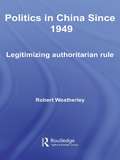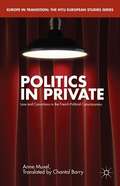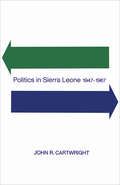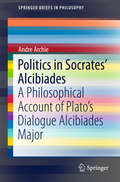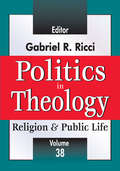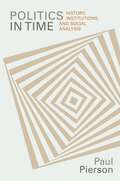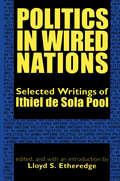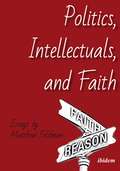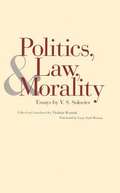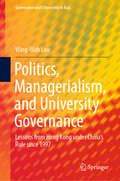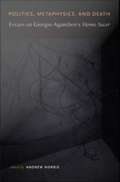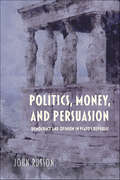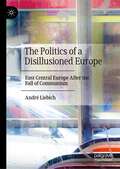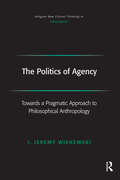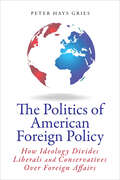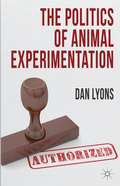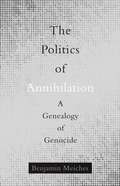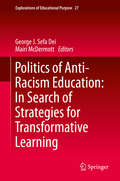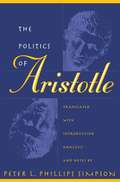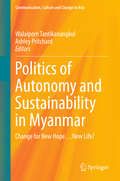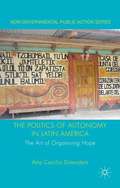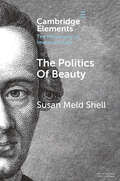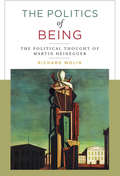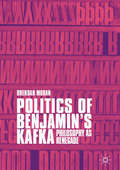- Table View
- List View
Politics in China since 1949: Legitimizing Authoritarian Rule (Routledge Contemporary China Series #Vol. 11)
by Robert WeatherleySince the victory of the 1949 revolution the incumbency of the Chinese Communist Party has been characterized by an almost relentless struggle to legitimize its monopoly on political power. During the Mao era, attempts to derive legitimacy focused primarily on mass participation in political affairs, a blend of Marxist and nationalist ideology, and the charismatic authority of Mao Zedong. The dramatic failure of the Cultural Revolution forced the post-Mao leadership to discard these discredited paradigms of legitimacy and move towards an almost exclusively performance based concept founded on market economic reform. The reforms during the 1980s generated a number of unwelcome but inevitable side effects such as official corruption, high unemployment and significant socio-economic inequality. These factors culminated ultimately in the 1989 demonstrations in Tiananmen Square and throughout China. Since Tiananmen the party has sought to diversify the basis of its legitimacy by adhering more closely to constitutional procedures in decision making and, to a certain extent, by reinventing itself as a conservative nationalist party. This probing study of post-communist revolution Chinese politics sets out to discover if there is a plausible alternative to the electoral mode or if legitimacy is the exclusive domain of the multi-party system.
Politics in Commercial Society
by Istvan Hont Béla Kapossy Michael SonenscherScholars normally emphasize the contrast between the two great eighteenth-century thinkers Jean-Jacques Rousseau and Adam Smith. Rousseau is seen as a critic of modernity, Smith as an apologist. Istvan Hont, however, finds significant commonalities in their work, arguing that both were theorists of commercial society and from surprisingly similar perspectives.<P><P> In making his case, Hont begins with the concept of commercial society and explains why that concept has much in common with what the German philosopher Immanuel Kant called unsocial sociability. This is why many earlier scholars used to refer to an Adam Smith Problem and, in a somewhat different way, to a Jean-Jacques Rousseau Problem. The two problems―and the questions about the relationship between individualism and altruism that they raised―were, in fact, more similar than has usually been thought because both arose from the more fundamental problems generated by thinking about morality and politics in a commercial society.<P> Commerce entails reciprocity, but a commercial society also entails involuntary social interdependence, relentless economic competition, and intermittent interstate rivalry. This was the world to which Rousseau and Smith belonged, and Politics in Commercial Society is an account of how they thought about it.
Politics in Private
by Anne MuxelHave you ever fallen out with someone close to you over your political ideas or convictions or felt that a personal relationship was damaged because you disagreed about politics? There is no more interesting or diverse country than France to study how our political opinions influence the variety of relationships we engage in throughout our lifetimes. Using a unique approach, Anne Muxel offers a compelling account of the role our political opinions play in all our lives, whether those opinions are held strongly or not. She looks at the bonds between parents and children, brothers and sisters, husbands and wives, friends and colleagues, crossing the full spectrum of human relationships to reveal a brilliantly complex portrait of how politics and the emotions intersect. This book is a must, not just for readers interested in France and in politics but also for all those interested in the complexity of human relationships.
Politics in Sierra Leone 1947-1967
by John CartwrightSierra Leona is unique among African states in the extent of its commitment to competition between individuals and parties for political office. Until 1967 it maintained a political system marked by vigorous competition between parties and by numerous opportunities for the expression of diverse and discordant views, despite the fact that the pressures working against "open" politics were no less severe than those found in neighbouring states. The dominant group in Sierra Leone politics from the start of decolonization in 1947 until the military coup of 1967 was the Sierra Leone Peoples Party, a loose coalition based on the common interests of the traditional rulers and the emerging bourgeoisie. Under the first Prime Minister, Sir Milton Margai, this coalition maintained itself against electoral challenges by absorbing leaders of the opposition. However, growing dissatisfaction with the dominant Mende tribe and class discontent with the traditional rulers gradually eroded the position of these groups.In 1967 Sierra Leone passed the critical test of a competitive political system when the opposition party, the All Peoples Congress, defeated the SLPP and was called upon to form a government. This was the first time an opposition party in an independent tropical African state had come to power through the ballot box. Although the peaceful transfer of power was rudely shattered by a military coup, Sierra Leone had already demonstrated how firmly a competitive pattern of politics had been established, and just over a year later, an uprising of enlisted men against their officers restored the lawfully elected government, setting Sierra Leone once again on the path of a peaceful competition under constitutional rules.In this thorough and well-documented study Dr Cartwright explains how Sierra Leone maintained this pattern of political competition. He concludes that the traditionally oriented political leadership was able to maintain its position because of the relatively slow rate of social change outside the political sphere, and because of its own ability to adapt traditional patterns of behaviour to its new needs. He suggests that this traditional orientation played an important role in moderating the use of power by the new leaders and in making their position legitimate in the eyes of the people.Although primarily aimed at political scientists, and particularly those with an interest in African politics, this study is also important to scholars in related disciplines who are interested in the social structures and forces that bear on political activity. Written in a simple, direct style, it can be read and appreciated by anyone who wishes an account of what happened in the politics of one of the most interesting of the English-speaking African states.
Politics in Socrates' Alcibiades
by Andre ArchieThis volume provides the first full, political and philosophically rigorous account of Plato's dialogue Alcibiades Major. The book argues that Alcibiades Major accomplishes its goal, which is to redirect Alcibiades' political ambitions, not by arguing for specific propositions based on specific premises. The dialogue accomplishes its goal by generalizing the notion of argument to include appeals to Alcibiades' doxastic attitudes toward his ability and knowledge to become a powerful ruler of the Greek people. One such doxastic attitude that Alcibiades holds about himself, and one that Socrates deftly disabuses him of, is that he does not have to cultivate himself to be competitive with the local, Athenian politicians. Socrates reminds Alcibiades that his true competitors are not Athenian politicians, but rather the Spartan and Persian kings. Consequently, the psychological momentum of the dialogue is motivated by Socrates' aim to engender the right sort of beliefs in Alcibiades.
Politics in Theology: Religion And Public Life
by Gabriel R. RicciThis new volume examines the relationship between religion and politics from a historical perspective. Contributors address specific moments in which political governance intersects with religious ideals in dramatic ways. These moments question the relationship between religious sentiments and political solutions and threaten to reorder the geopolitical landscape.These essays discuss the tensions produced by secularism in an Islamic culture, the influence of Catholic theology in workers' political movements, and how Hinduism has been transformed by the political process. Also featured are essays that emphasize how civil religion coincides with constitutional order, and how the drama of religious tolerance and legitimization of the power of Christian hierarchy originated in the political power of the Roman emperor.This volume is an interdisciplinary effort from up-and-coming and cutting-edge scholars. Contents include: "Something as Yet Unfinished," Adam Stauffer; "Carl Schmitt, Leo Strauss, and the Necessity of Political Theology," Grant N. Havers; "Escape from Theology," Peter Grosvenor; "The Persistence of Civil Religion in Modern Canada," John von Heyking; "The Politicization of Hinduism and the Hinduization of Politics," Jeffery D. Long; "Ontology, Plurality, and Roman Catholic Social Teaching," Roland Boer; "The Pseudo-Isidorian Decretals and Church-State Conflict," Mary Sommar; "Thomas Aquinas on Providence, Prudence, and Natural Law," Christopher S. Morrissey; "The Mystical Body of Christ and French Catholic Action, 1926-1949," W. Brian Newsome; and "Secularism in Turkey," Oya Dursun-Ozkanca.
Politics in Time: History, Institutions, and Social Analysis
by Paul PiersonThis groundbreaking book represents the most systematic examination to date of the often-invoked but rarely examined declaration that "history matters." Most contemporary social scientists unconsciously take a "snapshot" view of the social world. Yet the meaning of social events or processes is frequently distorted when they are ripped from their temporal context. Paul Pierson argues that placing politics in time--constructing "moving pictures" rather than snapshots--can vastly enrich our understanding of complex social dynamics, and greatly improve the theories and methods that we use to explain them. Politics in Time opens a new window on the temporal aspects of the social world. It explores a range of important features and implications of evolving social processes: the variety of processes that unfold over significant periods of time, the circumstances under which such different processes are likely to occur, and above all, the significance of these temporal dimensions of social life for our understanding of important political and social outcomes. Ranging widely across the social sciences, Pierson's analysis reveals the high price social science pays when it becomes ahistorical. And it provides a wealth of ideas for restoring our sense of historical process. By placing politics back in time, Pierson's book is destined to have a resounding and enduring impact on the work of scholars and students in fields from political science, history, and sociology to economics and policy analysis.
Politics in Wired Nations: Selected Writings of Ithiel De Sola Pool
by Ithiel de Sola PoolIthiel de Sola Pool was a pioneering social scientist, a distinguished scholar of the political process, and one of the most original thinkers in the development of the social sciences. Passionately engaged in politics, he continued his role of leadership throughout his life, building the MIT Political Science Department into an outstanding group. He organized international teams of social scientists and collaborated widely to develop the understanding of social change. He was a frequent adviser to governments as consultant and in-house critic, and a successful advocate of limits on government regulation. Politics in Wired Nations presents his writings on the social and political impact of different communication systems and new telecommunications technology.Included in this volume is the first study of trends in a global information society, and the first study of social networks and the "small world" phenomenon that creates new relationships and routes of informal influence and political power, both domestic and international. Pool's essays on the politics of foreign trade, the influence of American businessmen on Congress, and changeable "unnatural" institutions of the modern world (e.g., bureaucracies, mega-cities, and nation-states) are herein contained. Pool describes a nonviolent revolution in freedom and political control that is possible as the world changes from the era of one-way mass communications--targeted to national audiences--to a new era of abundant, high-capacity, low-cost, interactive, and user-controlled communications on a global scale. He discusses policy choices for freedom, the battlegrounds ahead, and the risks of government involvement in the regulation of new telecommunication technologies.
Politics, Intellectuals, and Faith: Essays
by Matthew FeldmanThis wide-ranging collection of academic essays examines the various undertakings by modern intellectuals and ideologues in the process of propaganda and political debate. Matthew Feldman calls attention to the substantial role played in post-Great War Europe and the US by religions—both familiar monotheisms like Christianity and secular ‘political faiths’—over the last century of upheaval and revolutionary change. While the first part considers Ezra Pound as a case study in fascist ʼconversion’ in Mussolini’s Italy, leading to extensive propaganda, the second half examines other fascist ideologues like Martin Heidegger to fascist murderer Anders Behring Breivik, before turning to other leading ideologies in modern Europe and the US, communism and liberalism, covering key figures from Thomas Merton and Albert Camus to the Russian Constructionists and Samuel Beckett, with especial focus on the subjects of modern warfare, political terrorism, and genocide, ranging from Stalinist gulags to the war in Iraq. With thought-provoking discussion of the interplay between belief and modern politics as understood by familiar intellectual voices, this volume will be of interest to scholars and general readers alike.
Politics, Law and Morality: Essays By V. S. Soloviev
by Vladimir Soloviev Vladimir WozniukConsidered one of Russia's greatest philosophers, Vladimir Soloviev (1853-1900) was also a theologian, historian, poet, and social and political critic. His works have emerged to enjoy renewed attention in post-Soviet Russia, and his concerns echo in contemporary discussions of politics, law, and morality. In this collection of Soloviev's essays -- many translated into English for the first time -- the philosopher explores an array of social issues, from the death penalty to nationalism to women's rights. Soloviev reacts against the tradition of European rationalist thought and seeks to synthesize religious philosophy, science, and ethics in the context of a universal Christianity. In these writings he reveals the centrality of human rights in his Christian world-view, not only as an abstract theory but also as an inspiration in everyday life. In a substantive introduction and copious annotations to the essays, Vladimir Wozniuk points out distinctive and often overlooked features of Soloviev's works while,illuminating his place within both the Russian and Western intellectual traditions.
Politics, Managerialism, and University Governance: Lessons from Hong Kong under China’s Rule since 1997 (Governance and Citizenship in Asia)
by Wing-Wah LawThis book explores the interplay between politics, managerialism, and higher education, and the complex linkages between politics and public universities in Hong Kong. Since the mid-20th century, literature on the state, market, and higher education has focused on the state’s shifting role from the direct administration to the supervision of higher education, and its increased use of market and managerial principles and techniques to regulate public universities. However, very few studies have addressed the political influences on university governance produced by changing state-university-market relationships, the chancellorship of public universities, or students’ and academics’ civic engagement with regard to sensitive political issues. The book examines both the positive and problematic outcomes of using market principles and managerialism to reform public higher education; questions the longstanding tradition of university chancellorship; explores the issue of external members holding the majority on university governing boards; probes into the dilemma of either relying on the system or a good chancellor and external members to preserve universities’ autonomy and academic freedom; and assesses the cost of students’ and academics’ civic engagement with regard to politically sensitive issues.
Politics, Metaphysics, and Death: Essays On Giorgio Agamben's Homo Sacer
by Andrew NorrisThe Italian philosopher Giorgio Agamben is having an increasingly significant impact on Anglo-American political theory. His most prominent intervention to date is the powerful reassessment of sovereignty and the politics of life and death laid out in his multivolume Homo Sacer project. Agamben argues that in both the modern world and the ancient, politics inevitably involves a sovereign decision that bans some individuals from the political and human communities. For Agamben, the Nazi concentration camps--in which some inmates are reduced to a form of living death--are not a political aberration but instead the place where this essential political decision about life most clearly reveals itself. Engaging specifically with Homo Sacer, the essays in this collection draw out and contend with the wide-ranging implications of Agamben's radical and controversial interpretation of modern political life. The contributors analyze Agamben's thought from the perspectives of political theory, philosophy, jurisprudence, and the history of law. They consider his work not only in relation to that of his major interlocutors--Hannah Arendt, Michel Foucault, Carl Schmitt, Walter Benjamin, and Martin Heidegger--but also in relation to the thought of Plato, Pindar, Heraclitus, Descartes, Kafka, Bataille, and Derrida. The essayists' approaches are varied, as are their ultimate evaluations of the cogency and accuracy of Agamben's arguments. This volume also includes an original essay by Agamben in which he considers the relation of Benjamin's "Critique of Violence" to Schmitt's Political Theology. Politics, Metaphysics, and Death is a necessary, multifaceted exposition and evaluation of the thought of one of today's most important political theorists. Contributors: Giorgio Agamben, Andrew Benjamin, Peter Fitzpatrick, Anselm Haverkamp, Paul Hegarty, Andreas Kalyvas, Rainer Maria Kiesow , Catherine Mills, Andrew Norris, Adam Thurschwell, Erik Vogt, Thomas Carl Wall
Politics, Money, and Persuasion: Democracy and Opinion in Plato's Republic (Studies in Continental Thought)
by John RussonIn Politics, Money, and Persuasion, distinguished philosopher John Russon offers a new framework for interpreting Plato's The Republic. For Russon, Plato's work is about the distinctive nature of what it is to be a human being and, correspondingly, what is distinctive about the nature of human society. Russon focuses on the realities of our everyday experience to come to profoundly insightful assessments of our human realities: the nature of the city, the nature of knowledge, and the nature of human psychology. Russon's argument concentrates on the ambivalence of logos, which includes reflections on politics and philosophy and their place in human life, how humans have shaped the environment, our interactions with money, the economy, and the pursuit of the good in social and political systems. Politics, Money, and Persuasion offers a deeply personal but also practical kind of philosophical reading of Plato's classic text. It emphasizes the tight connection between the life of city and the life of the soul, demonstrating both the crucial role that human cognitive excellence and psychological health play in political and social life.
The Politics of a Disillusioned Europe: East Central Europe After the Fall of Communism
by André LiebichMoving from the fall of the Berlin Wall in 1989 to the present day, this book traces the trajectory of the six East Central European former satellites of the Soviet Union (Poland, Hungary, the Czech Republic, Slovakia, Romania, Bulgaria) that have joined the European Union. It seeks in particular to explain these countries’ disenchantment with the “return to Europe” in spite of their significant advances. The book proceeds country by country and then devotes chapters to some contemporary issues, such as minorities, migration, and the relations of these “new” members with the European Union as a whole. The book eschews theory and is intended for a general audience, including students at all levels in political science and history classes devoted to the EU and to contemporary Europe, and to an academic and practitioner audience interested in world affairs and the evolution of the European Union. The book strives to fill a persistent knowledge gap in the English-speaking world concerning East Central Europe, and to offer fresh insights about the region in the context of contemporary geopolitics.
The Politics of Agency: Toward a Pragmatic Approach to Philosophical Anthropology (Ashgate New Critical Thinking in Philosophy)
by J. Jeremy WisnewskiDebates about individualism and holism, reductionism and phenomenology, and naturalism and humanism all turn on how we answer the basic questions about the nature of human agency. This book argues that the traditional emphasis on the accuracy of a given theory of human agency has systematically obscured the normative dimension in these theories and that recognizing this normative dimension allows us to see that a pragmatic approach to theories of agency, either in social science or moral philosophy, is more appropriate. As well as offering a vigorous presentation of the pragmatic-therapeutic account of agency Wisnewski also engages critically with three rival accounts from Nietzsche, Foucault and Rorty.
The Politics of American Foreign Policy: How Ideology Divides Liberals and Conservatives over Foreign Affairs
by Peter Hays GriesIn this provocative book, Peter Gries directly challenges the widely held view that partisan elites on Capitol Hill are out of touch with a moderate American public. Dissecting a new national survey, Gries shows how ideology powerfully divides Main Street over both domestic and foreign policy and reveals how and why, with the exception of attitudes toward Israel, liberals consistently feel warmer toward foreign countries and international organizations, and desire friendlier policies toward them, than conservatives do. And because most Congressional districts have become hyper-partisan, many politicians today cater not to the "median voter" in their districts, but to the primary voters who elect them. The perverse incentives of the U.S. electoral system, therefore, are empowering the ideological extremes, contributing to elite partisanship over American foreign policy. The Politics of American Foreign Policy weaves seamlessly together in-depth examinations of the psychological roots and foreign policy consequences of the liberal-conservative divide, the cultural, socio-racial, economic, and political dimensions of American ideology, and the moral values and foreign policy orientations that divide Democrats and Republicans. Within this context, the book explores in detail why American liberals and conservatives disagree over US policy relating to Latin America, Europe, the Middle East, East Asia, and international organizations such as the UN.
The Politics Of Animal Experimentation
by Dan LyonsThe reality of animal experimentation and its regulation in Britain have been hidden behind a curtain of secrecy since its emergence as a political controversy in the 1870s. Public debate and political science alike have been severely hampered by a profound lack of reliable information about the practice. In this remarkable study, Dan Lyons advances and applies policy network analysis to investigate the evolution of British animal research policy-making.
The Politics of Annihilation: A Genealogy of Genocide
by Benjamin MeichesHow did a powerful concept in international justice evolve into an inequitable response to mass suffering?For a term coined just seventy-five years ago, genocide has become a remarkably potent idea. But has it transformed from a truly novel vision for international justice into a conservative, even inaccessible term? The Politics of Annihilation traces how the concept of genocide came to acquire such significance on the global political stage. In doing so, it reveals how the concept has been politically contested and refashioned over time. It explores how these shifts implicitly impact what forms of mass violence are considered genocide and what forms are not. Benjamin Meiches argues that the limited conception of genocide, often rigidly understood as mass killing rooted in ethno-religious identity, has created legal and political institutions that do not adequately respond to the diversity of mass violence. In his insistence on the concept’s complexity, he does not undermine the need for clear condemnations of such violence. But neither does he allow genocide to become a static or timeless notion. Meiches argues that the discourse on genocide has implicitly excluded many forms of violence from popular attention including cases ranging from contemporary Botswana and the Democratic Republic of Congo, to the legacies of colonial politics in Haiti, Canada, and elsewhere, to the effects of climate change on small island nations. By mapping the multiplicity of forces that entangle the concept in larger assemblages of power, The Politics of Annihilation gives us a new understanding of how the language of genocide impacts contemporary political life, especially as a means of protesting the social conditions that produce mass violence.
Politics of Anti-Racism Education: In Search of Strategies for Transformative Learning
by George J. Sefa Dei Mairi McdermottThis collection of essays invites readers to think through critical questions concerning anti-racism education, such as: How does anti-racism education centre race as an analytic and simultaneously work with multiple sites of oppression, without reifying hierarchies of difference? How can anti-racism education be engaged to speak to historical questions of power and privilege, within conventional schooling practices? How do we recognize anti-racism education in its many iterations? In this book the authors explore the knowledge that constitutes anti-racism education and the ways in which knowledge constitutive of anti-racism education becomes embodied through particular pedagogues. The authors are anti-racism educators with experiences in diverse settings: the chapters cover various fields and socio-historic geographies, address contemporary educational issues, and are situated within personal-political, historical and philosophical conversations. Anti-racism education is a discursive stance and steeped in politics that shape and are shaped by everyday conversations, theories, and practices. The essays in this collection work through many of the possibilities and limitations of engaging in counter-hegemonic education for transformative learning. Readers will discover lived experiences, theory, practice and critical reflexivity.
The Politics of Aristotle
by Aristotle Peter L. Phillips SimpsonA touchstone in Western debates about society and government, the Politics is Aristotle's classic work on the nature of political community. Here, he discusses the merits and defects of various regimes or ways of organizing political community - democracy in particular - and in the process examines such subjects as slavery, economics, the family, citizenship, justice, and revolution.
Politics of Autonomy and Sustainability in Myanmar
by Walaiporn Tantikanangkul Ashley PritchardThis book focuses on the tensions between and conflict resolution processes concerning minority ethnic groups in Myanmar's rural areas and the State. It covers topics such as relations and communication between the central government, the Kokang Chinese community and the Kachin State; the impact of cyclone Nargis on remote settlements in the Ayeyarwady Delta; the impact of depletion of mangrove forests and Yangon's fuel needs on a Karen minority group; and the collapse of a community forestry project in a Pa-O village in Shan State. Written by young scholars from Myanmar, some of whom belong to minority groups, the book provides firsthand reporting and scholarship that, for the past sixty years, have not been available. Offering in-depth, unique insights into minority change issues in the interior and at the periphery of Myanmar, as seen from local perspectives, it offers a valuable resource for academics, students and researchers in the fields of sustainable development, social and political studies, and development communication in Asia.
The Politics of Autonomy in Latin America
by Ana Cecilia DinersteinThe author contests older concepts of autonomy as either revolutionary or ineffective vis-à-vis the state. Looking at four prominent Latin American movements, she defines autonomy as 'the art of organising hope': a tool for indigenous and non-indigenous movements to prefigure alternative realities at a time when utopia can be no longer objected.
The Politics Of Beauty: A Study Of Kant's Critique Of Taste (Elements in the Philosophy of Immanuel Kant)
by Susan Meld ShellThis Element examines the entirety of Kant's Critique of Taste (in Part One of the Critique of Judgment) with particular emphasis on its political and moral aims. Kant's critical treatment of aesthetic judgment is both an extended theoretical response to influential predecessors and contemporaries, including Rousseau and Herder, and a practical intervention in its own right meant to nudge history forward at a time of civilizational crisis. Attention to these themes helps resolve a number of puzzles, both textual and philosophic, including the normative force and meaning of judgments of taste, and the relation between natural and artful beauty.
The Politics of Being: The Political Thought of Martin Heidegger
by Richard WolinMartin Heidegger's ties to Nazism have tarnished his stature as one of the towering figures of twentieth-century philosophy. The publication of the Black Notebooks in 2014, which revealed the full extent of Heidegger's anti-Semitism and enduring sympathy for National Socialism, only inflamed the controversy. Richard Wolin's The Politics of Being: The Political Thought of Martin Heidegger has played a seminal role in the international debate over the consequences of Heidegger's Nazism. In this edition, the author provides a new preface addressing the effect of the Black Notebooks on our understanding of the relationship between politics and philosophy in Heidegger's work. Building on his pathbreaking interpretation of the philosopher's political thought, Wolin demonstrates that philosophy and politics cannot be disentangled in Heidegger's oeuvre. Völkisch ideological themes suffuse even his most sublime philosophical treatises. Therefore, despite Heidegger's profundity as a thinker, his critique of civilization is saturated with disturbing anti-democratic and anti-Semitic leitmotifs and claims.
Politics of Benjamin’s Kafka: Philosophy As Renegade
by Brendan MoranThis book provides a critical assessment of Benjamin’s writings on Franz Kafka and of Benjamin’s related writings. Eliciting from Benjamin’s writings a conception of philosophy that is political in its dissociation from – its becoming renegade in relation to, its philosophic shame about – established laws, norms, and forms, the book compares Benjamin’s writings with relevant works by Agamben, Heidegger, Levinas, and others. In relating Benjamin’s writings on Kafka to Benjamin’s writings on politics, the study delineates a philosophic impetus in literature and argues that this impetus has potential political consequences. Finally, the book is critical of Benjamin’s messianism insofar as it is oriented by the anticipated elimination of exceptions and distractions. Exceptions and distractions are, the book argues, precisely what literature, like other arts, brings to the fore. Hence the philosophic, and the political, importance of literature.
